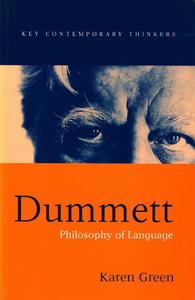
Green, Karen, "Dummett: Philosophy of Language"
English | 2013 | ISBN: 0745666728, 074562295X, 0745622941 | PDF | pages: 249 | 1.9 mb
Michael Dummett stands out among his generation as the only British philosopher of language to rival in stature the Americans, Davidson and Quine. In conjunction with them he has been responsible for much of the framework within which questions concerning meaning and understanding are raised and answered in the late twentieth-century Anglo-American tradition. Dummett's output has been prolific and highly influential, but not always as accessible as it deserves to be. This book sets out to rectify this situation.
Karen Green offers the first comprehensive introduction to Dummett's philosophy of language, providing an overview and summary of his most important arguments. She argues that Dummett should not be understood as a determined advocate of anti-realism, but that his greatest contribution to the philosophy of language is to have set out the strengths and weaknesses of the three most influential positions within contemporary theory of meaning - realism, as epitomised by Frege, the holism to be found in Wittgenstein, Quine and Davidson and the constructivism which can be extracted from Brouwer. It demonstrates that analytic philosophy as Dummett practices it, is by no means an outmoded approach to thinking about language, but that it is relevant both to cognitive science and to phenomenology.
Links are Interchangeable - No Password - Single Extraction



